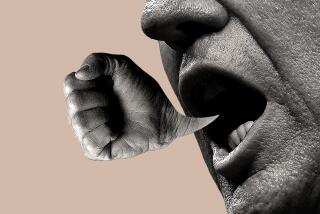NEWS ANALYSIS : A Demoralized White House Moves Swiftly to Regroup
WASHINGTON — The White House, still reeling from the slap of repudiation delivered by voters Tuesday, is searching for a path that allows President Clinton to salvage some of his agenda and his political future.
Clinton and his staff, if anything, appeared to be more demoralized at the end of the week than they were immediately after Tuesday’s GOP binge, in which voters turned over both houses of Congress to Republicans and seemed to decisively reject Clinton’s vision of an activist government.
As the President prepared for a weeklong trip to Asia, he was inundated with assessments of the election--and contradictory recommendations for what to do with what is left of his term in office.
The suggestions range from a wholesale staff and Cabinet shake-up to a new emphasis on foreign policy achievements, to an ideological war with the conservative new Congress.
In any event, an urgent reassessment is under way, both in Washington and among Clinton’s traveling party. At the last minute, he dragooned senior adviser George Stephanopoulos to accompany him on the Asia trip to coordinate staff discussions on the Administration’s future policies and politics and to begin plotting a course for Clinton’s expected reelection drive.
As White House factions battle among themselves for the President’s ear, it appears that an early winner is the moderate wing of the Democratic Party that nurtured the young governor of Arkansas and helped elect him President.
Clinton said Thursday that he plans to return to the “New Democrat” agenda that was the cornerstone of his 1992 campaign. It calls for smaller, more efficient government, an emphasis on personal responsibility and restoration of the American dream.
He also said that he will spend more time carrying out laws Congress already has approved, rather than proposing new measures, and that he will travel around the country to try to do a better job of selling his programs.
“There’s no question about the message voters sent Clinton: ‘You said you were a different kind of Democrat, but you haven’t governed as one,’ ” said Al From, director of the centrist Democratic Leadership Council, reflecting views that he passed to Clinton in a memo last week. “I’m not sure he’s gotten that message yet, because they’re all in a state of shellshock and denial over there. But it’ll sink in soon.”
Certain casualties of the midterm elections are the sweeping health care reform plan devised by First Lady Hillary Rodham Clinton and a welfare reform plan. If either is to have any hope of passage in the new Congress, it will be in a much more limited form with modest or no impact on the 1996 budget.
Personnel changes also appear inevitable. White House political director Joan Baggett and Democratic National Committee Chairman David Wilhelm are said to be on their way out. Several other top White House aides, including chief domestic policy adviser Carol Rasco, press secretary Dee Dee Myers and staff secretary John Podesta, are likely to be eased out or conclude on their own that there’s more fun and more money to be had elsewhere.
In a post-election news conference Wednesday and again in a speech Thursday, Clinton referred back almost wistfully to his one unambiguous triumph, the 1992 campaign. He said that he intends to try to deliver on the campaign’s central promises of greater economic security for the middle class and broader opportunity for all.
“I’m not going to compromise on my convictions,” Clinton asserted Wednesday.
Yet Clinton has been nagged throughout his presidency by public confusion over what his convictions are. Even his friends have said that Clinton badly strayed from the centrist message that he ran on, either trading away his principles for votes or abandoning his moderate stance to embrace liberal crime and health plans.
“Clinton has become a man defined more by his failures than his successes,” From said. “He defined health care as being what his Administration was about and he proposed a big liberal failed program. The crime bill was another real turning point because opponents successfully likened it to a mother sending a teen-ager to a store for a quart of milk with $20 and having the kid come back with the milk and $19 worth of junk food.”
Clinton is now consulting with aides and outside advisers to find a formula for governing and to craft a new message that responds to the voters’ evident displeasure with what he and Congress have delivered during the last two years.
A flurry of memos has been flying around the White House offering ideas on how to “redefine the Clinton presidency,” a quest that the White House has embarked on rather publicly many times in his 22 months in office.
Some memos suggest a rightward shift that would return him to the New Democrat agenda combined with a search for common ground with Republicans in Congress on such issues as political and governmental reform, budget discipline and changes in federal welfare programs.
Vice President Al Gore, former Chief of Staff Thomas (Mack) McLarty and a number of other top aides have endorsed this approach, saying it not only responds to public anger but most closely comports with Clinton’s campaign promises.
“That’s the message he ran on and the one he believes in,” said a top aide. “The reason the message was so effective in 1992 is that it was what Clinton deeply believed and spent years working on. He thinks it got lost in the partisan clatter. This year has been one of intense partisanship and acrimony and everything we did was a very tough fight.”
But other advisers, among them Stephanopoulos and political consultant Paul Begala, are urging a more combative, populist approach, pointing to Harry S. Truman’s successful response to the massive Republican gains of 1946.
They are saying that compromise with Congress and incremental attempts at reform are likely to further erode the President’s popularity and his stature as a leader. They are advocating what they call “an outside game,” going over the heads of Congress and the media to appeal to the disenchanted middle class with jobs programs and a message of moral renewal.
Begala said that Clinton likely would pursue both courses at once. “You’ll see him both emphasizing government reform issues that the President and many moderate Democrats have been long advocating and have been frustrated in pursuing. And you’ll see a more aggressive populist stance, pointing out the differences between Democrats and Republicans on such issues as the deficit, women’s rights and gun control.”
Both camps believe that Clinton needs to take some time to rest and think about what he hopes to accomplish in the next two years. They are once again trying to stifle his tendency to think out loud and talk too much, as he did on Thursday, mournfully mulling over Tuesday’s results before an audience at Georgetown University.
He told the audience at his undergraduate alma mater that the public was angry and upset because these are not “normal times.” He admitted that he thought that his Administration had made a good start at addressing the nation’s problems and was stunned to find that the public violently disagreed.
Looking weary, Clinton said that the way the Administration and Congress have done their business recently has been “messy” and “almost revolting.”
The speech was supposed to be an overview of Clinton’s foreign policy and a kickoff to Clinton’s trip to the Asian economic summit. His rambling remarks were unplanned--and unwelcome to his staff.
More to Read
Sign up for Essential California
The most important California stories and recommendations in your inbox every morning.
You may occasionally receive promotional content from the Los Angeles Times.









